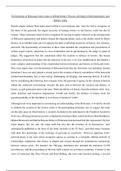Do historians at Holocaust trials create or defend history? Discuss referring to both perpetrators' and
deniers’ trials.
French scholar Annette Wieviorka observed that it was historians who ‘were the first to recognize, in
the midst of the genocide, the urgent necessity of bearing witness so that history could one day be
written.’ Many historians acted on this recognition by serving as expert witnesses at the ensuing trials
of Holocaust perpetrators and deniers despite the ongoing debate, such as the doubts raised by Henry
Rousso, as to whether trials can ever appease the often-conflicting exigencies of history, law, memory,
and truth. The functionality of historians at these trials included the compilation and presentation of
written expert reports, subjection to cross-examination and to questioning by the judge or panel of
judges. The suggestion that this constituted either the creation or defence of history, this binary
dichotomy, adversarial in nature like the character of the law, is an over-simplification that hinders a
more complex understanding of the relationship between historians and history at Holocaust trials.
This essay argues that, over the duration of Holocaust trials thus far, historians (not including ‘pseudo
historians’) have not only played a crucial part in the creation of history and defence of the historical
method and discipline, but, in uncovering, challenging, developing, and nuancing history. It will do
this by considering the following four concepts. First, the question of agency in the creation of history
within the courtroom environment. Second, the grey area in-between the creation and defence of
history as each generation turns to the past. Third, the defence of history from the methods of the ‘non-
ideal’ historian and historical negationism. Fourth and finally, the defence of history from the
questioned ability of the discipline to ever discover historical ‘truths’.
Although trials were important in constructing an understanding of the Holocaust, it would be invalid
to attribute the creation of this history solely to the participating historians (nor to suggest that trials
are the only space in which history is created). Included in the indictment of the Frankfurt Auschwitz
Trial was a 200-page historical account, compiled by historians Hans-Adolf Jacobsen, Hans Buchheim,
Helmut Krausnick and Martin Broszat. Rebecca Wittmann demonstrated that this represented ‘the first
major inquiry into not only the camp itself but also into the structure of its bureaucracy’ and,
subsequently published as the basis of the book Anatomy of the SS State, ‘provided many Germans
with their first knowledge of the workings of genocide at Auschwitz.’ However, applying Actor-
network theory to the trial, which recognises agency as existing in a constantly shifting network of
relationships, emphasises that history is shaped and created through the simultaneous interactions
between various actors. For instance, the 700-page indictment also included the testimony of 252
eyewitnesses, and the proceedings of the trial itself centred on eyewitness testimony. Contrary to the
views of historians like Peter Novick and Raul Hilberg, this had value beyond eliciting a visceral
1
, reaction. Eyewitness testimony was a critical aspect in the collaborative enterprise of the creation of
history, facilitating the integration of collective memory to establish a history that was more nuanced
than one founded only on documentation produced by the Nazis. Actor-network theory’s controversial
insistence on the capacity of non-human actors to influence and participate in these networks also
requires, for example, recognition of the impact of the legal system in which the trial was operating.
In the determination of guilt, the requirements of the 1871 West German Penal Code did not
accommodate for the identification of the ethnicity of the victims or the wider program of racial
annihilation as fundamental features of the Holocaust. Consequently, the historical narrative created
at the trial, which was the product of interactions among and between human and non-human actors,
implied that the policy of genocide and the Nazi policy governing the treatment of inmates at
Auschwitz was permissible, distinguishing perpetrators from accomplices largely by their subjective
orientation toward the crime in question.
In response to the historical narrative centred on barbaric political regimes and aggressive warfare that
was created at the preceding Nuremberg trials, the Eichmann Trial alternatively developed an
understanding of a Jewish Holocaust that had been marginalised at the aforementioned trials. This is
reflective of history as a process that has no closure as, captured by Marianne Hirsch’s notion of
‘postmemory’, each generation turns to the past for the purposes of the present and the future. Gideon
Hausner, who led the prosecution at the Eichmann Trial, believed the trial would ‘bring the youth
closer to the nation’s past’, no doubt simultaneously intending to further the contemporary Zionist
cause. In this ceaseless process, much of what historians have done at Holocaust trials functioned in
the grey area in-between the creation and defence of history. For instance, in the expert witness
testimony of Jewish historian Salo Baron during the Eichmann Trial, his insistence of the agency of
individuals in history contributed to widening the understanding of complicity during the Holocaust.
Baron also challenged accusations of Jewish passivity during the Holocaust, attesting to the extent of
Jewish resistance as a manifestation of Jewish agency. This became a source of considerable
antagonism, especially following the publication of Hannah Arendt’s Eichmann in Jerusalem, in which
Arendt accused Jewish leaders of leading Jews to their deaths ‘like sheep to the slaughter.’ However,
contradictions within Baron’s testimony reveal an instance of the irreconcilable expectations and
pressures put on historians at trials as they grapple with history and the law. David Myers outlined that
Baron had been directed to offer testimony in a ‘comprehensive and thorough but at the same time
sharp and engaging, exacting in detail and yet lapidary in assessing the full course of Jewish history’,
that ‘there had existed a dispersion [i.e., the Diaspora] in possession of great values’, while adding
‘credence to a linear narrative that culminated in its destruction.’ Baron testified that ‘the Nazi
2




